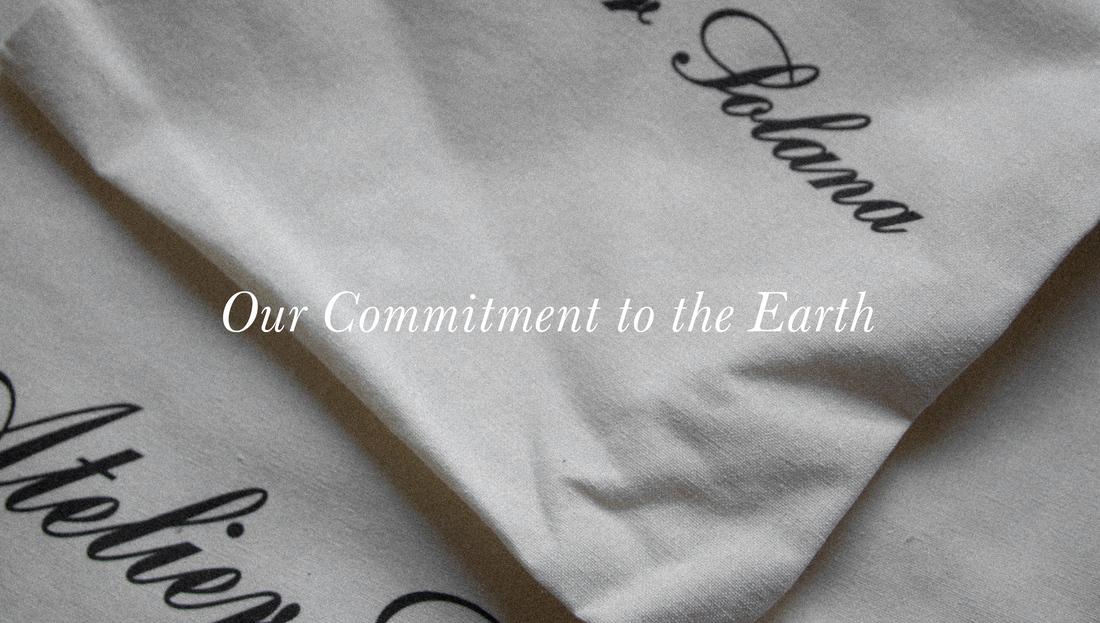It's an unfortunate fact that the fashion industry is a major contributor in pollution and carbon emissions. The fashion sector was responsible for producing 2.1 billon metric tonnes of greenhouse-gas emissions in 2018, approximately 4 percent of the global total for GHG emissions. The fashion industry emits approximately the same quantity of GHGs per year as the entire economies of France, Germany, and the U.K. combined. (McKinsey & Company, 2020) We aim to return to the old ways of fashion production, with methods that do not involve exploiting the planet or the people that inhabit it.
Sustainability and transparency have always been at the forefront of our mission at Solana. Here's how we minimize our impact on the Earth, so that we can enjoy our beautiful planet for years to come.
Closed-loop System
The fashion industry creates 92 million tons of textile waste each year, and it is incredibly important for us to not be contributors to such waste. We operate on a closed-loop system, meaning that no materials that we bring into the Atelier are ever wasted. We utilize excess materials from garments to create some of our signature 'scrap yarn' styles, such as the Recycled Stardust Sweater, Solar Top, and more. Smaller scraps of yarn are used to package our orders.
Natural Fibres
We utilize 100% natural fibres in all of our designs, with the exception of the Camille sweater, which is 72% natural. Natural fibres boast improved durability and quality, so clothing made with natural fibres simply lasts longer. This durability, combined with our exceptional handmade craftsmanship, is why our styles are considered heirloom-quality. Unlike synthetic fibres, natural materials will return to the Earth at the end of their lifespan -- composting into the Earth, instead of becoming a source of pollution.
Made-to-Order Model
Atelier Solana uses a made-to-order production model, which prevents the creation of dead stock. In the mainstream fashion industry, garments that don't sell are often first destroyed so that they cannot be worn again and are then thrown into landfill. We do not keep an excess stock of garments, so we avoid this entirely.
Sustainable Packaging
Orders are wrapped using recycled and/or FSC-certified paper, dyed with plant-based dyes, and are sent off using 100% compostable mailers. The adhesives used on our FSC-certified shipping labels and recycled paper tape are non-toxic and compostable. Our garment bags are made from 100% organic cotton with plant-based dye. We designed these bags with reusability in mind, and we encourage you to use our garment bags for years to come.
Plastic-free Components
Every detail on Atelier Solana styles has been meticulously considered. Our favour for natural materials extends to the smaller components as well. Instead of using plastic buttons, we opt for natural materials such as olive wood and mother of pearl. The thread, pearls, and many other components that we use are completely natural.

Timeless styles
Major fast fashion brands release new styles each day, wreaking havoc on the environment with production levels beyond what the industry standard was even 10 years ago. These styles are often designed to trend and go out of style quickly, with many items being considered "out of style" after mere weeks. As a result, the volume of clothes Americans throw away has doubled over the past 20 years. We design our garments with longevity in mind, never following trends simply for the sake of it. We hope that you will cherish your Atelier Solana styles for years to come.
As Ngan Le states, "As an individual strolls into a store and purchases a few items at the mall, a thought that may cross our mind is how it is possible for such affordable clothing to be made in mass quantities. Of course, the fast fashion industry and its respective factories found a way. Among the various issues regarding fast fashion and how its industry has been able to boom, the various destructive effects on the environment remain a major concern. To manufacture clothes, the fast fashion industry exports its production business overseas for cheap labor to avoid the high minimum wages implemented by many developed governments. Even though typical consumers in the North American market may be able to afford clothes for a cheaper price, fast fashion comes with a price tag with a handful of consequences. Thus, it falls upon us - the consumers - to explore alternatives to tackle the neglected environmental impact of such consumerism." (Le, 2020)
It is clear that our planet cannot sustain this rate of over-consumption and waste. As a clothing brand, it is our responsibility to provide transparency at every step in the process. We are always striving to minimize our impact on the planet, and what we have done is just a tiny part of what we aim to do in the future. Thank you for supporting our mission.
Berg, A., Granskog, A., Lee, L., & Magnus, K. H. (2020, August 26). Fashion on Climate. Mckinsey & Company.
Dean, C. (2020). Waste - Is it Really 'in' Fashion? Fashion Revolution.
Le, N. (2020, July 20). The Impact of Fast Fashion on the Environment. Princeton Student Climate Initiative.
Monroe, A. (2021, February 6). Ultra-Fast Fashion is Eating the World. The Atlantic.

